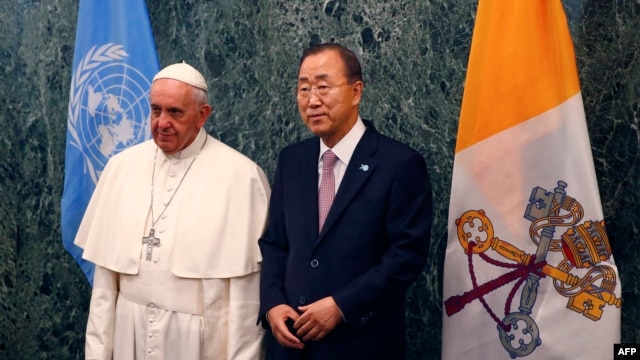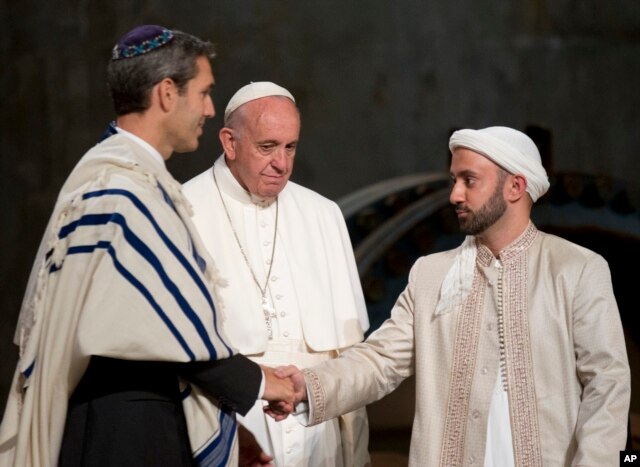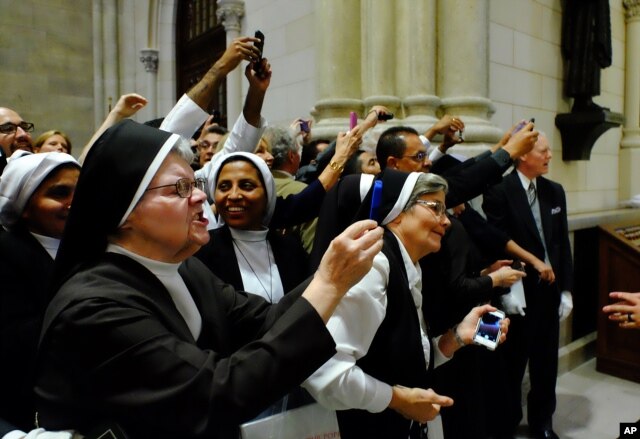At UN, Francis Pleads for Protecting Environment and Poor
Pope Francis, left, poses with United Nations Secretary-General Ban Ki-moon at U.N. headquarters in New York, Sept. 25, 2015.
Last updated on: September 25, 2015 12:27 PM
In an address to the U.N. General Assembly, Pope Francis exhorted presidents and prime ministers to show leadership in combating climate change and poverty and in protecting refugees fleeing conflicts.
The 78-year-old pontiff, speaking Friday morning at the United Nations headquarters in New York, tied "misuse and destruction of the environment" with what he called the "relentless process" of economic and social exclusion of disadvantaged members of society.
"In effect, a selfish and boundless thirst for power and material prosperity leads both to the misuse of available natural resources and to the exclusion of the weak and disadvantaged," Francis said in Spanish to the dignitaries seated before him in the General Assembly chamber.
Those who are "excluded," he added, are left outside the realm of economic development and advancement, "either because they are differently abled [handicapped], or because they lack adequate information and technical expertise, or are incapable of decisive political action.
"Economic and social exclusion is a complete denial of human fraternity and a grave offense against human rights and the environment," Francis said.
"In effect, a selfish and boundless thirst for power and material prosperity leads both to the misuse of available natural resources and to the exclusion of the weak and disadvantaged," Francis said in Spanish to the dignitaries seated before him in the General Assembly chamber.
Those who are "excluded," he added, are left outside the realm of economic development and advancement, "either because they are differently abled [handicapped], or because they lack adequate information and technical expertise, or are incapable of decisive political action.
"Economic and social exclusion is a complete denial of human fraternity and a grave offense against human rights and the environment," Francis said.
He urged government leaders to take concrete steps "for preserving and improving the natural environment and thus putting an end as quickly as possible to the phenomenon of social and economic exclusion, with its baneful consequences: human trafficking, the marketing of human organs and tissues, the sexual exploitation of boys and girls, slave labor, including prostitution, the drug and weapons trade, terrorism and international organized crime."
Francis also called for providing, among all people, "the minimum spiritual and material means needed to live in dignity and to create and support a family.... In practical terms, this absolute minimum has three names: lodging, labor and land; and one spiritual name: spiritual freedom, which includes religious freedom, the right to education and other civil rights."
Francis also appealed to the world leaders to "work tirelessly to avoid war," which he called “the negation of all rights and a dramatic assault on the environment.
Citing conflicts in "the entire Middle East, North Africa and other African countries," as well as in Ukraine, he urged the international community, "particularly through the norms and mechanisms of international law, to do all that it can to stop and to prevent further systematic violence against ethnic and religious minorities’ and to protect innocent peoples."
Applause interrupted the pontiff's lengthy speech, especially when he spoke of the need to protect the environment, aid the poor and educate girls. Before the pope's arrival, the great hall had a festive atmosphere, with diplomats greeting one another at the start of the annual meeting. Some were taking selfies, others just jovially chatting.
9/11 memorial visit, multifaith service
After Francis' address, the Roman Catholic Church leader continued a hectic schedule on the fourth day of his historic U.S. visit, first heading to the National September 11 Memorial, where the World Trade Center once stood.
He greeted relatives of some of the 2,606 people killed at the site 14 years ago. Nearly 3,000 died in the terrorist attacks that day in New York, Washington and Pennsylvania.
There, at an interfaith meditation on peace, Francis prayed for "peace for all who died here" and at the other sites, as well as for the healing of those who’d lost loved ones. "Bring your peace to our violent world," he asked in English.
Later, in Spanish, he noted the memorial's pool and other features. "Water, falling, also symbolizes our tears" over "the pain that we feel at injustice" and the inability to solve our differences through dialogue."
The Catholic leader stood with representatives of other faiths – including Muslims, Jews, Buddhists and Hindis – who offered prayers and song.
Pope Francis looks at Imam Khalid Latif, right, and Rabbi Elliot J. Cosgrove, left, shaking hands as he arrives for an interfaith service at the Sept. 11 memorial museum in New York, Sept. 25, 2015.
School visit
Later Friday, the pope will visit a Roman Catholic elementary school in the heavily Hispanic and black neighborhood of East Harlem, and greet tens of thousands of people during a drive through New York's Central Park.
In the evening, he will celebrate Mass at Madison Square Garden before an estimated 20,000 worshipers, presiding over the service from a chair built primarily by day laborers.
Later Friday, the pope will visit a Roman Catholic elementary school in the heavily Hispanic and black neighborhood of East Harlem, and greet tens of thousands of people during a drive through New York's Central Park.
In the evening, he will celebrate Mass at Madison Square Garden before an estimated 20,000 worshipers, presiding over the service from a chair built primarily by day laborers.
Echoes of congressional speech
The pope's U.N. address echoed similar concerns he'd raised in a Thursday morning address to a joint meeting of the U.S. Congress in Washington. He'd focused heavily on climate change, migration and immigration, but also reiterated the church's concerns for the sanctity of life.
Rich nations have a moral obligation to aid the vulnerable, Francis suggested in discussing "the creation and distribution of wealth."
"The right use of natural resources, the proper application of technology and the harnessing of the spirit of enterprise are essential elements" of an inclusive, sustainable economy, he continued.
Referencing his recent encyclical on the environment, Laudato Si, Francis called for "a courageous and responsible effort to ‘redirect our steps’ … and to avert the most serious effects of the environmental deterioration caused by human activity."
He also urged compassion, not hostility, in coping with the worst refugee crisis since World War II.
"We must not be taken aback by [migrants’] numbers, but rather view them as persons, seeing their faces and listening to their stories, trying to respond as best we can to their situation – to respond in a way which is always humane, just and fraternal," he told Congress.
Nuns, some angered by the pushing and shoving, scramble to get into position for a photograph of the Pope as he leaves St. Patrick’s Cathedral, Sept. 24, 2015 in New York.
Praise for nuns
Francis flew late Thursday afternoon from Washington to New York, where he began his visit to the nation's financial center with a prayer service at St. Patrick's Cathedral on posh Fifth Avenue.
There, he gave a special shout-out to American nuns, offering his "esteem and gratitude."
Calling them "women of strength, fighters, with that spirit of courage which puts you on the front lines in the proclamation of the Gospel," Francis said he wished "to say thank you, a big thank you... and to tell you that I love you very much."
His remarks, which drew a standing ovation from some of the nuns in the cathedral, further distanced Francis' pastoral approach from his predecessor's emphasis on strict adherence to church doctrine.
The main group representing American nuns, the Leadership Conference of Women Religious, had been the subject of a seven-year Vatican investigation over accusations that it had overemphasized social justice work and pushed "radical feminist themes incompatible with the Catholic faith."
The Vatican and LCWR resolved their differences in April, and Francis met with four of its leaders in Rome.
At St. Patrick's, Francis also offered support and encouragement to priests and bishops.
On to Philadelphia
The pope plans to leave New York Saturday morning for two days in Philadelphia, his final U.S. stop.
There, he'll attend the Vatican-sponsored World Meeting of Families and, on Sunday, will celebrate an outdoor Mass expected to draw nearly 2 million people.
The pope plans to leave New York Saturday morning for two days in Philadelphia, his final U.S. stop.
There, he'll attend the Vatican-sponsored World Meeting of Families and, on Sunday, will celebrate an outdoor Mass expected to draw nearly 2 million people.
VOA correspondent Margaret Besheer contributed to this report from the United Nations.




No comments:
Post a Comment